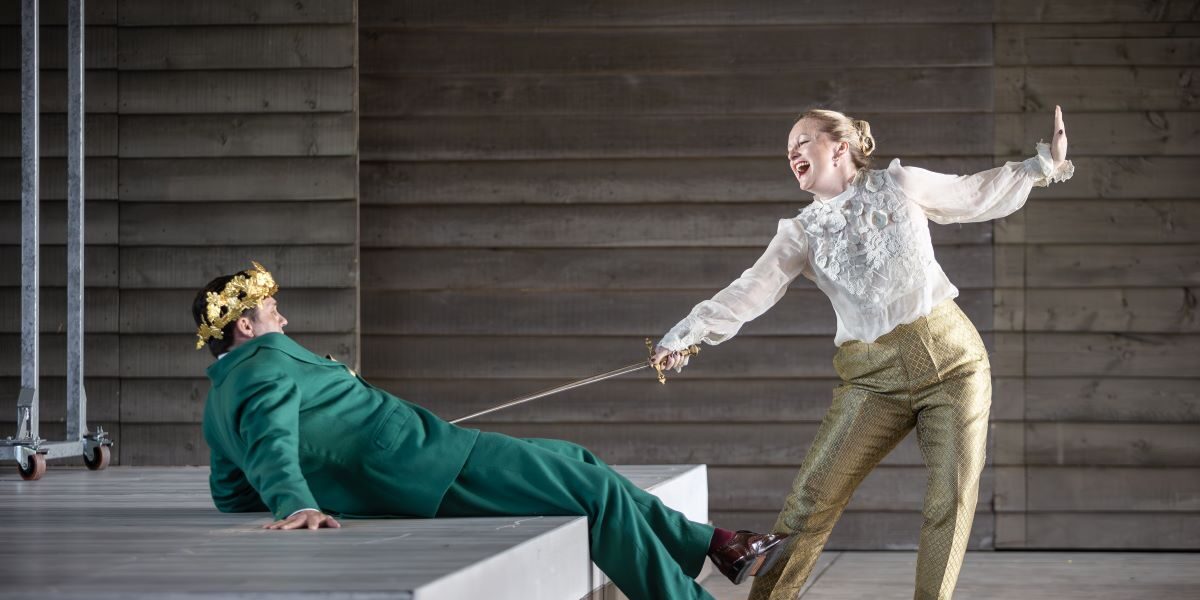Handel’s Rodelinda (1725) was written at the apogee of his operatic career, when Italian opera seria and Handel’s own contributions were at their most popular in London, and also most lucrative. Money was available to hire the best singers and players and this provided the platform for works of greater lavishness and complexity. What particularly distinguishes this opera, from, say, Giulio Cesare of the previous year, is not the plot, in this case a farrago of great genealogical complexity, but rather the huge variety of emotional moods displayed within. Explosions of rage and jealousy and threats of revenge are set off against exquisite evocations of pastoral memory, regret and joyful anticipation, all of which allow for deep development of character across the evening and the depiction of key dramatic dilemmas.
The centrepiece of the plot is a similar situation to the Odyssey. Bertarido has had to flee into exile, but his wife and son believe him to be dead and this places Rodelinda in a fundamental difficulty. Should she stay loyal to his memory or should she marry Grimoaldo, who has designs on the throne and is threatening her son, Flavio? How should she deal with the machinations of other characters, namely her sister-in-law, Eduige, and the real villain of the piece, from outside the family, Garibaldo. Where does the path of virtue lie? How can resourccefulness maintain hope? Her only ally is Unolfo, a loyal supporter of her husband.
There is no doubt that this opera primarily belongs to ther heroine, therefore; and director Ruth Knight certainly presents it that way, as a piece of feminist self-assertion. While this leads to some strong and telling scenes, there are also some over-simplifications and cartoonish moments that detract from the self-sufficient eloquence of the music. It was notable that the warmest applause came for numbers where the singers simply delivered text and music using the subtle variations of da capo structure, without over-elaborate staging. Oftentimes it is enough to trust the work itself.
Musically this was a hugely impressive evening. Lucy Crowe was resplendent in the hugely demanding title role. Her top notes were thrilling and dramatically earned, with exquisitely turned cadenzas and highly convincing acting. She was well matched by Tim Mead’s Bertarido, a difficult role to bring off, given that his most famous number, ‘Dove sei?’, comes early on in the action, and that his is off stage for long periods. But this was a reliable, consistently intelligent performance that warmed up as the evening proceeded, culminating in a superb account of ‘Vivi Tiranno!’ at the end.
As the key villains, Grimoaldo and Garibaldo, Ed Lyon and Brandon Cedel were vocally immaculate, providing powerful dramatic ccounterweights to the heroic figures and Hugo Cutting revealed himself as a true talent to watch in the secondary counter-tenor role of Unolfo. Marvic Monreal made the most of the somewhat underwritten role of of Eduige, and her velvety contralto blended pleasingly with the other voices on stage.
Peter Whelan’s direction was exemplary, not simply in showcasing the singers, but in finding nuanced colours and variation across the many repeats and orchestral introductions and postludes in ways that complemented and echoed the dramatic choices of the singers. Although Handel did not write a role for chorus, a wordless backing group of dancers accompanied and shadowed the action. Sometimes this enhanced matters, but at points it was an unnecessary distraction.
This production was at its best when it observed the dictum ‘less is more’; but musically it always did justice to the infinite variety of Handel’s felicitous invention.
George Frideric Handel
Director: Ruth Knight
Conductor: Peter Whelan
Cast includes: Brandon Cedel, Lucy Crowe, Hugo Cutting, Ed Lyon, Tim Mead, Marvic Monreal,
Until 19 July 2025
4 hours 30 mins with two intervals
Photo Credit: Craig Fuller

